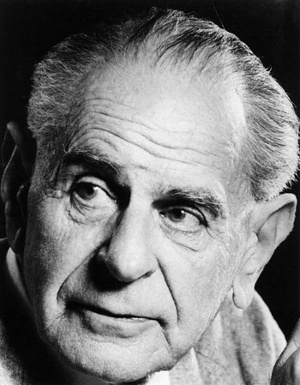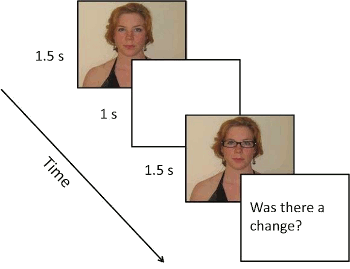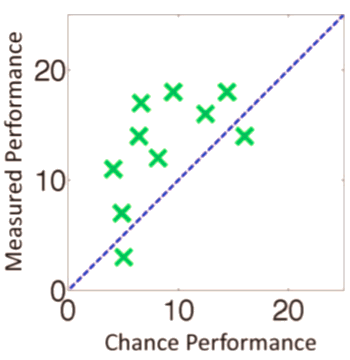A Sixth Sense?
February 21, 2014
Traditionally,
humans experience the world through five
senses; namely,
sight,
hearing,
taste,
smell, and
touch. Although there are other things that could qualify as a sense (
temperature, the passage of
time,
balance, etc.), we limit the designation, "sense," to just these five.

The Three Wise Monkeys, demonstrating the proverb, "see no evil, hear no evil, speak no evil."
The two at the ends are repressing their senses of hearing and sight.
(Via Wikimedia Commons.)
The
supernatural has always been a part of
human culture, so there's a belief in another sense, a sixth sense. Since this sense is outside the realm of the established senses, this sense is called
extrasensory perception (ESP). ESP encompasses such ideas as
telepathy; and
precognition, or knowledge of the future.
ESP has been an integral part of many entertaining
movies and
television shows. The
gray aliens ("grays"), communicate by telepathy, and one of the principal
humanoid characters in
Star Trek: The Next Generation is telepathic. ESP was a
plot element on television even in its
monochrome days. It's featured in a few episodes of
The Twilight Zone and
The Outer Limits.
There was a television series, "
The Sixth Sense," that ran for twenty-five one-hour episodes in 1972.[1] This series is notable for several reasons. One episode was written by
Star Trek's Gene L. Coon;
Rod Serling presented introductory material in four episodes; and quite a few A-list
guest stars were cast.
My favorite ESP-themed television series is "
Seeing Things," which ran from 1981-1987. The plot centers on a
reporter with the "Toronto Gazette" who has uncontrolled visions of future
murders. He's a modern
Cassandra, since these visions wreak havoc on his already chaotic life. Interestingly, the current ESP-themed television series,
Psych, does not suppose the reality of ESP; rather, the principal character fakes having psychic ability as a means of
livelihood.
From time to time, one
scientist or another has attempted to test whether some people do indeed have a sixth sense. In all cases, they entered a
peer-review mine field and were uniformly scorned by their
colleagues. One of the first such investigations was done by
Stanford Research Institute physicists,
Russell Targ and
Harold E. Puthoff.[3-4] The
US government funded 23 years of their studies in "
remote viewing" from 1972-1995.
Most scientists survive on annual program awards, so 23 years is a long time for any sort of
research. The project was terminated when it was concluded that remote viewing had not been demonstrated; and, also, that there was no
theoretical framework to believe that such a thing could exist.[5] However, as the
Popperians would say, such
experiments could never demonstrate that remote viewing did
not exist.

Karl Popper (1902-1994)
Popper is famous for the concept of falsifiability, that theories can never be proven, only falsified.
A common example of this idea is that observation cannot prove the theory that all swans are white, but observing just one black swan will render the theory false.
(Via Wikimedia Commons.)
Princeton Engineering Anomalies Research Lab, which existed from 1979-2007, did research on whether humans could remotely influence the functioning of
random number generators. As a
famous Dilbert cartoon demonstrates, it's difficult to interpret the success or failure of such experiments.
In a
previous article (Statistics and Precognition, February 10, 2011), I described experiments by Daryl Bem, an Emeritus Professor at
Cornell University. A statistical analysis of the experimental data provided evidence for the existence of precognition; that is, knowledge of the future. A peer reviewed paper of his results was published in the Journal of Personality and Social Psychology.
Bem conducted nine experiments with more than a thousand college student participants. In one experiment, the college students were asked to guess behind which of two simulated curtains on a computer monitor a particular image could be found. The students made the correct choice 53% of the time. Bem used Student's t-test, the most common statistical test used by psychologists, to analyze his data, and he concluded that there was less than a 1% chance that an experiment would show such a result if ESP did not exist.[6]
Other scientists immediately criticized the results, writing that the statistical test was not appropriate.[7-9] Bem's experiments were replicated by other scientists, and these showed a null result.[10] The authors of the paper presenting the replicated experiments wrote that "All three replication attempts failed to produce significant effects... and thus do not support the existence of psychic ability.[10]
Probably the greatest argument against the existence of ESP is the idea that, since it offers such a great survival advantage, the trait would have been favored by evolution so that we would all have this ability to a remarkable extent. After all, knowing that there's a bear lurking around a bend in the road would cause you to take another trail.
As recent experiments have shown, some instances of sixth sensing might just be a perceptual trick of our mind. Piers D. L. Howe and Margaret E. Webb of the School of Psychological Sciences of the University of Melbourne (Australia) have just published an open access paper in PLOS ONE on experiments that show how people can detect change in a scene without being able to identify or localize what has changed.[11-12]
Study participants were shown pairs of color photographs of the same woman. In some cases, the woman's appearance was changed from one image to the next; e.g., a different hairstyle, or (as shown in the figure), wearing eyeglasses. The first photograph was shown for 1.5 seconds, followed by a blank screen, followed by 1.5 seconds of the second photograph. The participants were then asked whether there was a change; and, if so, they were asked to select from a list of nine possible changes.[12]

Now you see it, now you don't.
An experiment to test whether an individual notices a changed image, but is not able to pinpoint what has changed.
(University of Melbourne illustration.)
The study participants were generally able to detect a change when they were not able to identify what, exactly, had changed. As a result, they had an unexplained "feeling" that a change had occurred. Says study coauthor, Piers D. L. Howe,
"There is a common belief that observers can experience changes directly with their mind, without needing to rely on the traditional physical senses... We were able to show that while observers could reliably sense changes that they could not visually identify, this ability was not due to extrasensory perception or a sixth sense."[12]

The results for individual study subjects for the experiment described above.
The data points above the line represent evidence that changes could be detected, but not described.
(Fig. 3 of ref. 11, licensed under the Creative Commons Attribution License.)
![]()
References:
- The Sixth Sense (1972) on the Internet Movie Database.
- Seeing Things (1981–1987) on the Internet Movie Database.
- R. Targ and H.E. Puthoff, "Information transfer under conditions of sensory shielding," Nature, vol. 251, no. 5476 (October 18, 1974), pp.602-607.
- H.E. Puthoff and R. Targ, "A Perceptual Channel for Information Transfer over kilometer distances: Historical perspective and recent research," Proc. IEEE, vol. 64, no. 3 (March, 1976), pp.329-254.
- Michael D. Mumford, Andrew M. Rose and David A. Goslin, "An Evaluation of Remote Viewing: Research and Applications," The American Institutes for Research, September 29, 1995.
- Daryl J. Bem, "Feeling the future: Experimental evidence for anomalous retroactive influences on cognition and affect," Journal of Personality and Social Psychology (Jan 31, 2011), doi: 10.1037/a0021524.
- Greg Miller, "ESP Paper Rekindles Discussion About Statistics," Science, vol. 331 no. 6015 (January 21, 2011), pp. 272-273.
- Eric–Jan Wagenmakers, Rudd Wetzels, Denny Borsboom and Han L. J. van der Maas, "Why psychologists must change the way they analyze their data: The case of psi: Comment on Bem (2011)," Journal of Personality and Social Psychology (Jan 31, 2011), doi: 10.1037/a0022790.
- Charles M. Judd and Bertram Gawronski, "Editorial Comment," Journal of Personality and Social Psychology (Jan 31, 2011), doi: 10.1037/0022789.
- Stuart J. Ritchie, Richard Wiseman and Christopher C. French, "Failing the Future: Three Unsuccessful Attempts to Replicate Bem's 'Retroactive Facilitation of Recall' Effect," PLoS ONE, vol. 7, no. 3 (March 14, 2012), Article No. e33423.
- Piers D. L. Howe and Margaret E. Webb, "Detecting Unidentified Changes," PLoS ONE, vol. 9, no. 1 (January 13, 2014), Article No. e84490.
- Debunking the sixth sense, University of Melbourne Press Release, January 14, 2014.
Permanent Link to this article
Linked Keywords: Human; sense; visual perception; sight; hearing; taste; smell; somatosensory system; touch; temperature; time; balance; The Three Wise Monkeys; proverb; Wikimedia Commons; supernatural; human culture; extrasensory perception; telepathy; precognition; film; movie; television program; television show; gray alien; humanoid; Star Trek: The Next Generation; plot element; monochrome; The Twilight Zone; The Outer Limits; The Sixth Sense; Star Trek: The Original Series; Gene L. Coon; Rod Serling; guest star; Seeing Things; reporter; murder; Cassandra; Psych; livelihood; scientist; peer-review; collegiality; colleague; Stanford Research Institute; Russell Targ; Harold E. Puthoff; Federal government of the United States; remote viewing; research; theory; theoretical; Popperian; experiment; Karl Popper (1902-1994); falsifiability; swan; Princeton Engineering Anomalies Research Lab; random number generation; random number generator; 2001-10-25 Dilbert cartoon; Daryl Bem; Emeritus Professor; Cornell University; statistics; statistical analysis; precognition; peer review; peer reviewed; academic publishing; scientific paper; Journal of Personality and Social Psychology; college; student; computer monitor; Student's t-test; psychologist; data; reproducibility; replication; survival of the fittest; survival advantage; phenotypic trait; evolution; bear; perception; perceptual trick; Piers D. L. Howe; Margaret E. Webb; School of Psychological Sciences; University of Melbourne (Australia); open access; PLOS ONE; hairstyle; eyeglasses; second; Creative Commons Attribution License.